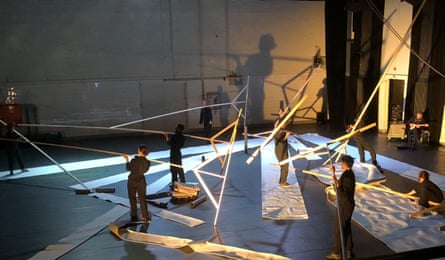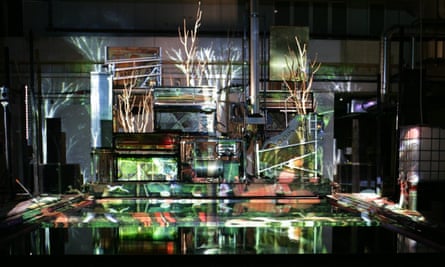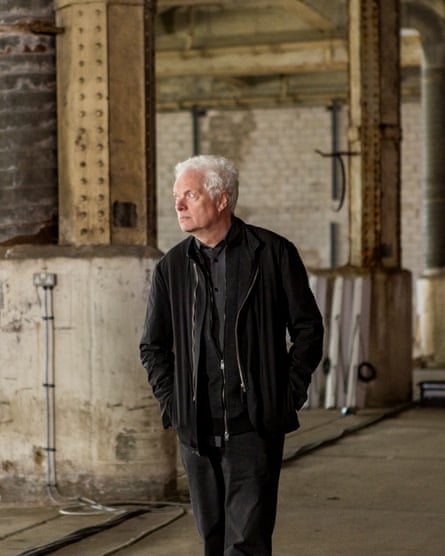Dancers in black jumpsuits twist and turn through hundreds of delicate beams of light. They reach up from their prison cells to clasp at daylight and bound about nervously on all fours. Then they morph into figures pumping iron in a gym, before becoming first world war soldiers in trenches going over the top.
At least, that’s what I imagine as I sit in on a rehearsal of Heiner Goebbels’ latest work on the vast, dank-smelling stage in Manchester’s old Mayfield railway depot. It seems indulgent to read so much into what I see before me – but that is exactly what the German artist and composer hopes spectators will do.
“Everybody comes with a different perspective,” he says. “The audience’s desire to connect what they see on stage with what they have experienced in real life is an important force.” Goebbels is dressed in black and keeps leaping on to the stage, his silver curls and the white flash on his shoes visible in the semi-darkness. He is a week into rehearsals for his latest work, Everything That Happened and Would Happen. Commissioned by 14-18 NOW, the UK’s arts programme to mark the centenary of the first world war, it is an oblique glimpse of European history covering more than 100 years, mixing improvised music, video installation and performance in what Goebbels says is deliberately non-symbolic theatre.
He will not, he cautions, be the pro-European German soothsayer, giving any answers about or insights into the tumults of Brexit, though he acknowledges people will likely bring their agitation about it to the venue. “I don’t consider theatre to be an instrument to make statements about reality,” he says. “I prefer theatre as an experience.”

The inspirations for this piece are the Czech author Patrik Ouředník’s 2001 book Europeana, a caustic anatomisation of modern European history; aspects of Goebbels’ 2012 production of Europeras by John Cage (including some spectacular boulders and tree-scapes); and a live feed from No Comment, the unedited news footage slot that airs on the Euronews TV channel (this acts as a sort of moving reflection of what’s going on in the real world, projected on to maps or blank canvases).
On the day I visit, the footage includes Usain Bolt in a zero-gravity plane racing against astronauts to promote a champagne brand, followed by a salvage operation to find survivors at a bombed-out building in Idlib, Syria. “These fragments are here for many reasons,” he says. “One is to make us make sense of what we see and hear ourselves – because there is no explanation, no comment. In so doing, we create confrontations and connections that are inspiring, because they’re not intentional or foreseeable. We’re looking for a poetical logic, not a linear logic.”
But is it not glib to show a champagne-swilling athlete next to the frantic efforts – possibly still ongoing as we watch – to uncover a family that might have been buried alive? “But that’s life,” he insists coolly. “The vicinity of terror and absurdity.” Ouředník’s book does the same, “showing there’s no appropriate way to speak about violence and catastrophes”. He compares it to Gertrude Stein’s memoir Wars I Have Seen, which he says lurches between “talking about food, weather and the preference of honey in wartime, to questioning when’s the right time to bomb Italians”.
Goebbels became interested in Ouředník’s book five years ago when it was recommended by a French actor friend. He has since scoured the world for editions of the 30 languages into which it has been translated. At the same time, he remains flummoxed at having never met anyone who has actually read the bestseller. “I’m still searching,” says the artist, who now has 20 versions in his possession.

Swedish, Spanish, French and English excerpts from the book – which gallops along breathlessly and is distinctly musical in rhythm – seep through the production. At one point, we hear a dancer recite in French how the gas used in trench warfare was “called mustard because it stung the nose like Dijon mustard … and how soldiers who returned home after the war did not want to eat Dijon mustard again”.
In the English passages – read by a Mancunian called Vinny because Goebbels wanted to include a local accent, we hear how, in the decades after world war two people’s idea of a confident future was one in which they would be able to have “a refrigerator and a cordless telephone and a dog and a cat and a tortoise and a vibrator and to take part in sports and attend psychoanalysis”. The French version of Ouředník’s book subsequently talks about the Bill Clinton/Monica Lewinsky scandal, while other English passages dwell on the memorial built by US soldiers to the 4,100 dogs who fell in Vietnam.
Water drips through the ceiling in certain places at the depot, and there’s also a pungent smell of sewage. “Don’t worry, it’ll be gone by the time of the performance,” says Goebbels. His bigger worry until now has been the strong wind that causes the black plastic lining sealing the walls of the passageway into the space to flap loudly. But then his sound engineer – one of a team of technicians who works permanently with him – suggested amplifying the sound and integrating it into the piece.

It is hard to know whether the gentle thrum of trams and the occasional shriek of sirens outside in Manchester Piccadilly – which all add admirably to the rhythm of the piece – haven’t been given the same treatment, or whether they’re a natural part of the soundscape. At the side of the stage, two robot organs have just been wheeled in, having arrived by lorry from a small town in Belgium. They are two of the many unusual props making up Goebbels’ sound spectacle.
His last major international touring show, around a decade ago, was Stifter’s Dinge, a gathering of self-propelling pianos, misty ponds, step-motor robots and pipes with bubble-wrap clappers, accompanied by Goebbels’ hauntingly chromatic score – and no actors. “A lot of people,” he says, “responded by saying, ‘Finally, nobody on stage telling me what to think.’ And this was the biggest compliment I could get.” I still carry that with me as an ambition. Though this time round, I have to hope that people will still say it even though there are people on the stage.”
Goebbels lived in a leftwing squat during his Frankfurt student days in the 1970s, when he was a member of the So-Called Left-Radical Brass Band. “I see a continuity for me,” he says. “The desire now is the same as it was back then. We always said we don’t want to make political music, we want to make music in a political way. And in the wider sense this applies here as well.”
He hopes his audiences – who are being urged to wear sturdy footwear, dress up warm and leave babes-in-arms at home – will go away from his performance feeling different. “But maybe not in the sense that they get an answer. Maybe in the sense that now they have more questions.”

Comments (…)
Sign in or create your Guardian account to join the discussion